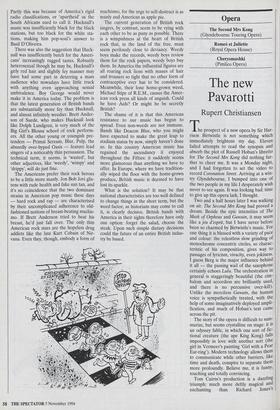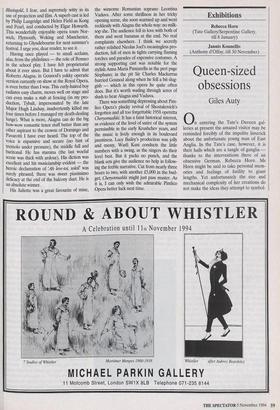Opera
The Second Mrs Kong (Glyndebourne Touring Opera)
Romeo et Juliette (Royal Opera House)
Cheryomushki (Pimlico Opera)
The new P avarotti
Rupert Christiansen
The prospect of a new opera by Sir Har- rison Birtwistle is not something which immediately brightens my day. Eleven failed attempts to read the synopsis and absorb the plot of Russell Hoban's libretto for The Second Mrs Kong did nothing fur- ther to cheer me. It was a Monday night, and I had forgotten to set the video to record Coronation Street. Arriving at a win- try Glyndebourne, I bumped into one of the two people in my life I desperately wish never to see again. It was looking bad: time to give up this opera lark, I thought.
Two and a half hours later I was walking on air. The Second Mrs Kong had proved a dream. Beside the epic intensities of The Mask of Orpheus and Gawain, it may seem like a jeu d'esprit, but I have never before been so charmed by Birtwistle's music. For one thing it is blessed with a variety of pace and colour: the relentless slow grinding of monochrome concentric circles, so charac- teristic of his composition, gives way to passages of lyricism, vivacity, even jokiness. I guess Berg is the major influence behind it all — the passing wail of the saxophone certainly echoes Lulu. The orchestration in general is staggeringly beautiful (the city- balom and accordion are brilliantly used, and there is no percussive over-kill). Unlike the merciless Gawain, the human voice is sympathetically treated, with the help of some imaginatively deployed ampli- fication, and much of Hoban's text came across the pit.
The story of the opera is difficult to sum- marize, but seems crystalline on stage: it is an odyssey fable, in which one sort of fic- tional creature (the ape King Kong) falls impossibly in love with another sort (the girl in Vermeer's painting 'Girl with a Pear Ear-ring'). Modern technology allows them to communicate while other barriers, like time and death, conspire to separate there more profoundly. Believe me, it is funny, touching and totally convincing. Tom Cairns's production is a dazzling triumph: much more deftly magical and enchanting than Richard Jones s Rheingokl, I fear, and supremely witty in its use of projection and film. A superb cast is led by Philip Langridge and Helen Field as Kong and Pearl, and conducted by Elgar Howarth. This wonderfully enjoyable opera tours Nor- wich, Plymouth, Woking and Manchester, returning to Glyndeboume for next summer's festival. I urge you, dear reader, to see it.
Having once played — to small acclaim, alas, from the philistines — the role of Romeo in the school play, I have felt proprietorial about it ever since. But I have to admit that Roberto Alagna, in Gounod's yukky operatic version currently on show at the Royal Opera, is even better than I was. This curly-haired boy radiates easy charm, moves well on stage and can even make a stab at fencing (in my pro- duction, Tybalt, impersonated by the late Major Hugh Lindsay, inadvertently killed me four times before I managed my death-dealing lunge). What is more, Alagna can do the big bow-wow romantic tenor stuff better than any other aspirant to the crowns of Domingo and Pavarotti I have ever heard. The top of the voice is expansive and secure (no hint of tremolo under pressure), the middle full and baritonal. He has stamina (the last woeful scene was thick with ardour). His diction was excellent and his musicianship evident — the heroic declamation of `Ah leve-toi, soled' was surely phrased, there was sweet pianissimo delicacy at the end of the balcony duet. He is an absolute winner.
His Juliette was a great favourite of mine, the winsome Romanian soprano Leontina Vaduva. After some shrillness in her tricky opening scene, she soon warmed up and went recklessly with Alagna the whole way: no milk- sop she. The audience fell in love with both of them and went bananas at the end. No real complaints elsewhere. I think we secretly rather relished Nicolas Joel's meaningless pro- duction, full of men in tights carrying flaming torches and parades of expensive costumes. A strong supporting cast was notable for the stylish Anna Maria Panzarella as the pert page Stephano; in the pit Sir Charles Mackerras hurried Gounod along when he fell a bit slug- gish — which in this opera he quite often does. But it's worth wading through acres of slush to hear Alagna and Vaduva.
There was something depressing about Pim- lico Opera's plucky revival of Shostakovich's forgotten and all too forgettable 1958 operetta Cheyomushki. It has a faint historical interest, as evidence of the level of satire of the system permissible in the early Krushchev years, and the music is lively enough in its boulevard jauntiness. Lucy Bailey's production was jolly and messy, Wash Kani conducts the little numbers with a swing, as the singers do their level best. But it packs no punch, and the blank sets give the audience no help in follow- ing the feeble narrative. Cut from nearly three hours to two, with another £5,000 in the bud- get, Cheryomushki might just pass muster. As it is, I can only wish the admirable Pimlico Opera better luck next time.











































































 Previous page
Previous page